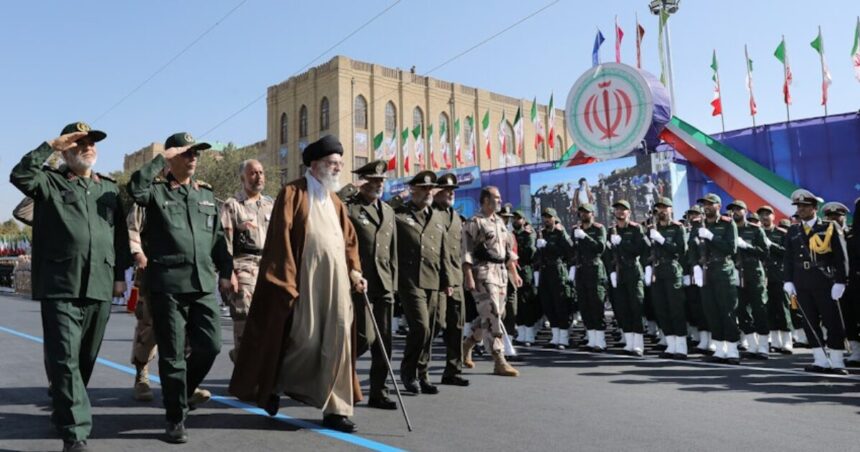
As Iran, China, Russia, and North Korea form an anti-American alliance, Democrats call President Trump a threat to national security.
Misguided concerns and wasted resources have left the country vulnerable to attack and displacement by China.
Since the fall of the Soviet Union, the United States has emerged as the world’s sole superpower, leading many in the West to believe their way of life is safe from significant threats.
This complacency allows countries like China and Iran to maneuver strategically against Western interests, often without significant pushback.
While US citizens and governments are divided in a heated left-right contest, Iran and its allies are working on a long-term plan to undermine Western dominance and reshape the global order.
Iran has targeted President Trump multiple times with hacking and assassination-for-hire plots.
Joe Biden is oblivious to the threat from Iran, he has warned Israel to counterattack, while Trump rightly said that Netanyahu should “blow them to pieces.”
Democrats undermine Republicans, without thinking about how their opponents are exploiting their internal vulnerabilities.
This lack of a comprehensive strategy leaves the US and the West unprepared to make difficult decisions that may require short-term sacrifices for long-term security. Meanwhile, the opponents are eager to destroy the foundations of society from within.
Iran is an important member of the anti-Western bloc that includes China, Russia, North Korea, and organizations like the Muslim Brotherhood.
Despite ideological differences and historical tensions, these entities find common ground in their opposition to Western hegemony.
They cooperated to reduce the economic, military, and technological advantages of the West.
In March 2024, China, Russia, and Iran held joint naval exercises in the Gulf of Aden and the Arabian Sea, under the name “Maritime Security Belt – 2024.”
This is the fifth exercise since 2019, covering an area that includes three of the world’s most strategic straits.
The exercise involved more than 20 ships and marked the first time that observers from other countries, such as Pakistan, India, and South Africa, were allowed to participate.
While Beijing has said the drills are unrelated to recent developments in the Middle East, the incident comes amid heightened tensions, including attacks on commercial ships and escalating conflicts in the region.
The exercise is a clear signal to the west of the trio’s intention to project power and strengthen its position.
In October 2024, the President of Iran, Masoud Pezeshkian, met with the President of Russia Vladimir Putin, further strengthening the relationship between the two countries.
Iran has actively sought closer ties with Russia, including military cooperation that has important implications for regional stability. Iran has transferred drones, such as the Shahed 136, to Russia, which are used in the conflict in Ukraine.
This military collaboration goes beyond drones. Iran is interested in more military-to-military ties with Russia, including ballistic missiles and advanced weaponry.
In return, Iran could seek Russian support for its activities in the Middle East.
Iran has used proxies in many countries to pressure its enemies, especially Israel.
There have been reports of drone strikes and other military actions against Israeli targets, attributed to Iranian-backed groups. Evidence shows coordination between Iran, Hezbollah, and other groups in planning and executing attacks.
Russia’s closer ties with Iran have raised concerns about Moscow’s role in the regional conflict.
Both Iran and Russia support the Assad regime in Syria, and Russia’s willingness to ignore or even tacitly support Iranian activities in the Middle East could further destabilize the region.
The main tactic used by this alliance is to create an alternative to the financial system and economic network dominated by the West.
Iran, sanctioned by the West, has found partners in China and Russia willing to bypass the ban.
China imports about 90% of Iran’s oil exports, providing a vital economic lifeline for Tehran. Russia, facing its own sanctions since the 2022 invasion of Ukraine, has expanded its dependence on Iran for drones and missiles to bolster its military.
The three countries also work in multilateral organizations like BRICS and the Shanghai Cooperation Organization to strengthen economic ties and promote a multipolar world order.
The aim is to reduce dependence on the US dollar by creating new payment systems and trade routes, challenging the financial dominance of the West.
Despite their shared opposition to the West, significant challenges lie within the alliance.
Iran’s relationship with China is complicated; Tehran is increasingly dissatisfied with economic results, as the volume of trade with China lags behind other regional countries such as the UAE and Saudi Arabia.
China, while deepening ties with Iran, remains cautious not to undermine its broader global economic interests.
In addition, Iran and Russia face obstacles in developing cooperation.
The two countries are major oil exporters competing for the Chinese market, leading to a price war that often favors Russia because of its logistical advantages and the risks associated with fewer sanctions for buyers.
Although there are clear signs of coordination between the enemy countries, the West remains hesitant to take decisive action.
Economic relations with countries like China continue to be unhindered, and sanctions against Iran are inconsistent.
This indecisiveness allows the enemy to benefit from Western resources while simultaneously undermining Western interests.
The reluctance to acknowledge and address Iran’s involvement in regional conflicts hinders an effective response and creates enemies.
To combat these multiple threats, the West must adopt a more strategic long-term perspective. Acknowledging the existence of an anti-Western alliance is the first step.
The US and its allies must contain Iran through sanctions and direct military action to dismantle its nuclear program and cut off funding to terrorist organizations like Hamas, Hezbollah, the Islamic Revolutionary Guard Corps (IRGC), and the Houthis.
Until this is done, neither the region nor the world will be safe—and Trump is more likely to take decisive action on this than Kamala Harris.




